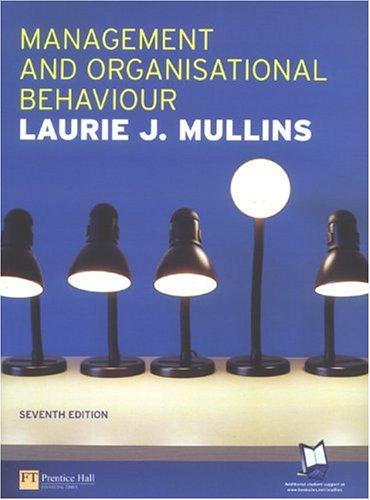These questions are designed to help you reflect on how well your company is doing, and to
Question:
These questions are designed to help you reflect on how well your company is doing, and to generate ideas for improvement. If you would like to benchmark yourself against other companies, please contact The Centre for Tomorrow's Company.
TERMINOLOGY
The term 'Company' relates to business here, but you can adapt and interpret the questionnaire for other forms of organisation such as firm, partnership, public service, non-profit-making etc. 'Customers' include clients, consumers, end-users, intermediaries, wholesalers, and distributors, subscribers, members and trustees. 'Employees' include staff, colleagues, associates, people, volunteer helpers, self-employed contractors and trade unions. 'Suppliers' include conventional suppliers as well as business partners and joint ventures.
'Investors' include private and institutional shareholders, lending banks, donors and funders. 'Community' encompasses local, national, worldwide and governmental; and from a social, philanthropic and environmental standpoint.
QUESTIONS a Purpose and vision
1. Do the directors have a shared understanding of the company's purpose, one that is couched in other than purely financial or commercial terms, and do they believe in it?
2. Is the company embarked on a journey that is founded in a vision of the company's future, which is communicated and shared with the company's stakeholders?
3. How meaningful to the company's various stakeholder groups are the purpose and vision?
b. Values and beliefs
4. Is there a clear set of shared values, standards, business ethics, etc., which form the basis for actions, decisions and behaviour by the company and those acting in its name?
5. Is there consistency from top to bottom between stated values and actual behaviours, i.e. are the espoused values being lived out in practice?
6. When did you last review your company's statement of philosophy, values and behaviour standards?
7. Has the leadership built a robust and sustainable culture that has the capacity to live on beyond the tenure of the present leader(s)?
c. Leadership development
8. What leadership development provision is made for those with the potential for senior management positions?
9. Does the organisation offer:
- early opportunities to practise leadership;
- mentoring and feedback to develop self-awareness in current and potential leaders;
- opportunities to reflect on and develop a template of values to inform future leaders' decision-making?
d. Leadership succession
10 How does the organisation help current leaders to be objective about their own lifecycle, recognising when they have become part of the problem rather than part of the solution, and knowing when it is in the company's best interest for them to step aside to make way for a successor?
11. How objective is the present leadership about the possibility of handing power over to those with a different approach (i.e. not selecting in one's own image).
e. Sharing the fruits of success
12. Does the leadership have a clear rationale for remuneration and the sharing of the fruits of success in line with the company's stated values?
13. Is the rationale widely understood, communicated and respected throughout the company?
14. Do share-based bonus schemes or their equivalent apply to everyone in the company?
15. Does your company submit directors' remuneration to shareholders for their approval?
f. Your own leadership competence and development
16. Are you confident in your own ability to:
- engage stakeholders in the development of vision and strategy?
- maintain dialogue and manage the relationship with all stakeholders?
- identify and make provision for future leaders?
- surround yourself with people who will complement your own strengths?
- be open to challenge and to the opinions of others?
- coach and mentor others?
- engage in lifelong learning, and help others to learn?
- take appropriate risks?
- help people change?
- enable people to confront uncomfortable realities?
17. Where does most scope exist to improve capability and performance in terms of the tomorrow's company model of leadership, for you personally and for the wider leadership?
18. How clear are you concerning the kind of organisation you want to lead?
19. How aware are you of your own leadership style, alternative models of leadership and the range of options available, and the conscious choices you have made?
Step by Step Answer:






